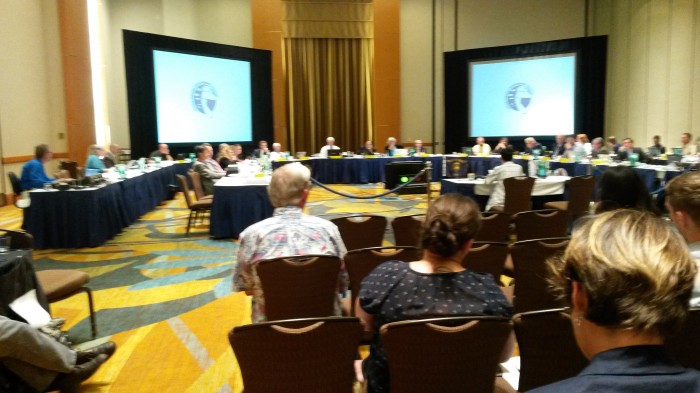
Pacific Fisheries Management Council meeting
Happy 4th of July! This day is all about celebrating independence, democracy and freedom. But what is the point of celebrating these gifts every July if we don’t make the most of them during the rest of the year?
This has been the question on my mind since I attended the Pacific Fisheries Management Council meeting on June 22nd. It all started with a mass email I received from Oceana asking for volunteers to come speak during public comment in support of transitioning the California swordfish drift gillnet fishery to more sustainable fishing gears.
My first reaction was, this sounds important, I should do it! My second reaction was, oh my gosh the meeting is on a Sunday at 8am in Garden Grove (an hour south of Los Angeles). After discovering these details, my interest quickly diminished. A debate inside my mind ensued…should I go? But that would mean leaving LA at 7am to get there on time. But this is important, I care about the oceans and if I can’t be bothered to go, then who can?
Plus, as someone who used to work in government, I know how these things go. Everything gets delayed, agenda items get pushed back and what was supposed to have been a morning affair turns into an all day meeting marathon. Thankfully, Oceana staff were on top of things and after I contacted Ashley Blacow, Oceana’s Pacific Policy and Communications Manager, about going to the meeting she kept me up to date about what was going on. It turns out that the Pacific Fisheries Management Council meets for five days in a row!
Five days discussing fish. Five times a year. Wow.
Around 10pm Saturday night, Ashley notified me via email that the Council was running behind on the agenda and that I didn’t need to arrive in Garden Grove until 2pm. On Sunday, she texted me a few times with updates and then around noon she texted that a 1pm start time seemed likely. I jumped in the car and headed south.
Ashley met me in the lobby of the Hyatt Regency and talked me through what was going to happen, what the Council was doing and what to expect during public comment. Then she ushered me into the Council meeting and introduced me to Dr. Geoff Shester, Oceana’s California Program Director.
It turns out that Geoff had been at the meeting since the beginning and had two more days to go, I was impressed. He was great about explaining different aspects of the meeting and who was who. As the meeting was going on and the Council reviewed presentations, charts and graphs, I started preparing my public comments.
And this is when it hit me…I had left the comforting steady hum of my computer for public speaking, what?! Having something to read was the only way I was going to get through my two minutes or less of public comment without collapsing on the floor in a pile of nerves, sweat and tears.
And then, once the Council was ready for public comments and I heard my name, I went to the microphone and here’s what I said in a shaky voice with gasps between sentences: Thank you Madam Chair, I am speaking today as an individual. Also, thanks to the Pacific Fisheries Management Council for all the work you do managing more than 100 fish species off the West Coast. As a whale watcher and marine mammal enthusiast, I’m asking you to phase out the use of drift gillnets in the swordfish fishery as soon as possible. Unfortunately, the nets are much too effective and in addition to catching swordfish, they also catch endangered sperm whales, baleen whales, dolphins, endangered sea turtles, sea lions, seals, mola molas and sharks. And while I understand the challenges in balancing the interests of many different stakeholders, the biggest stakeholder in this process is the overall health of our coastal ocean. All the species caught by drift gillnets are part of a broader ocean ecosystem and each plays a role in maintaining ocean health and balance. Through bycatch, drift gillnets kill too many iconic and important species with 20 to 30 percent of fish caught tossed back into the ocean dead or injured. Thankfully there is a solution! Please move forward with switching to sustainable fishing gears for swordfish such as surface hook and line and harpoon gear as soon as possible. For critically endangered sea turtles and sperm whales, every second counts and every life matters. Thank you for your time and consideration.
While I feel like I could have said something better or something more powerful, in the end I’m just glad that I said something. The most important thing is that the Council saw me speak, got the drift (no pun intended) of my message and knew that I cared. Public comment is about saying something, not eloquence.
The truth is that celebrating democracy and participating in democracy are two very different things. Fireworks and parades vs. meetings in over-air conditioned rooms and shifting agendas. The first is much more fun, but the second is so much more important. Democracy happens at meetings like the Pacific Fisheries Management Council, it’s not glamorous, but it’s government in action.
Thanks to all the environmental organizations, fishermen and regular people who showed up to speak during public comment. Without communication, there isn’t accurate representation. So the next time there is some type of government body meeting in your neck of the woods discussing something you care about, head on over there, even if it’s on a Sunday morning at 8am and say something. That’s the only way democracy works.
(Note: Also, a big thanks to Ashley and Geoff with Oceana for all their help and for all the great work they’re doing to help our oceans.)
Wow, congratulations and thanks for speaking on our–and everything’s–behalf.